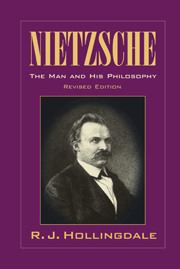Book contents
- Frontmatter
- Contents
- Preface to the Revised Edition
- A List of Nietzsche's Works
- Part I 1844-1869
- Part II 1869-1879
- Part III 1879-1889
- 8 The Turning-Point
- 9 The Wanderer
- 10 Lou Salome
- 11 Zarathustra
- 12 The Solitary
- 13 The Year 1888
- 14 The Revaluation
- 15 The Poet
- 16 The Collapse
- PART IV 1889-1900
- Postscript 1999
- Selective Bibliography
- Index
16 - The Collapse
from Part III - 1879-1889
Published online by Cambridge University Press: 13 September 2019
- Frontmatter
- Contents
- Preface to the Revised Edition
- A List of Nietzsche's Works
- Part I 1844-1869
- Part II 1869-1879
- Part III 1879-1889
- 8 The Turning-Point
- 9 The Wanderer
- 10 Lou Salome
- 11 Zarathustra
- 12 The Solitary
- 13 The Year 1888
- 14 The Revaluation
- 15 The Poet
- 16 The Collapse
- PART IV 1889-1900
- Postscript 1999
- Selective Bibliography
- Index
Summary
But to reveal my heart entirely to you, friends: if there were gods, how could I endure not to be a god! Therefore there are no gods. I, indeed, drew that conclusion; but now it draws me. (Z II 2)
As he was leaving his lodgings on the morning of the 3rd January 1889 Nietzsche saw a cabman beating his horse at the cab rank in the Piazza Carlo Alberto. With a cry he flung himself across the square and threw his arms about the animal's neck. Then he lost consciousness and slid to the ground, still clasping the tormented horse. A crowd gathered, and his landlord, attracted to the scene, recognized his lodger and had him carried back to his room. For a long time he lay unconscious. When he awoke he was no longer himself: at first he sang and shouted and thumped the piano, so that the landlord, who had already called a doctor, threatened to call a policeman too; then he quietened down, and began writing the famous series of epistles to the courts of Europe and to his friends announcing his arrival as Dionysus and the Crucified. How many he wrote is not known for certain. Those directed to public figures announced that he, ‘the Crucified’, would be going to Rome ‘on Tuesday’ (the 8th January), where the princes of Europe, together with the Pope, were to assemble: a notice to this effect went to the secretary of state of the Vatican. The Hohenzollerns, however, were to be excluded, and the other German princes were advised to have nothing to do with them: even now the Reich is still the enemy of German culture.
To Peter Gast went a single line:
To my maestro Pietro. Sing me a new song: the world is transfigured and all the heavens rejoice. The Crucified.
To Brandes a slightly longer epistle:
After you had discovered me it was not difficult to find me: the difficulty now is to lose me … The Crucified.
Letters also went to (among others) Strindberg, Malwida, Bùlow, Spitteler and Rohde. Cosima received a single line:
Ariadne, I love you. Dionysus.
- Type
- Chapter
- Information
- NietzscheThe Man and His Philosophy Revised Edition, pp. 237 - 240Publisher: Cambridge University PressPrint publication year: 1999



